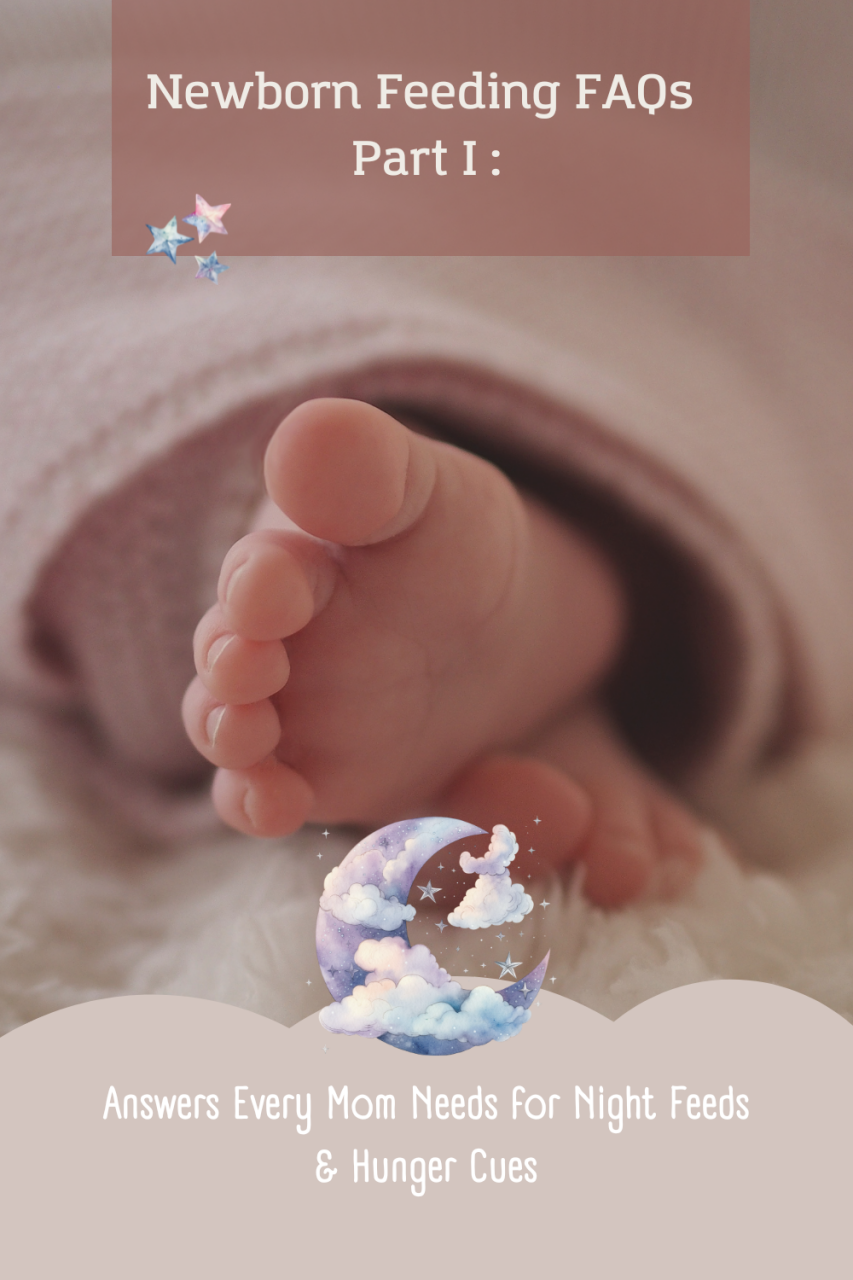Newborn Feeding FAQs -Part I : Answers Every Mom Needs for Night Feeds & Hunger Cues

Newborn Feeding FAQs -Part I :
Answers Every Mom Needs for Night Feeds & Hunger Cues
1. What is a normal feeding schedule for a newborn?
Newborns typically eat every 2–3 hours, or 8–12 times in 24 hours, whether breastfeeding or formula-feeding. This is measured from the start of one feeding to the start of the next.Feeding schedules vary depending on your baby's hunger cues, growth spurts, and whether they’re breastfed or formula-fed.
2. Should I feed my baby every time he wakes up at night?
In the early months, yes. Night waking is normal and usually indicates hunger in newborns. As they get older, they may wake for other reasons, but young babies generally wake because they need to eat. Always follow your baby's hunger cues.
3. Should I feed my baby every time he cries?
Not necessarily. Crying is actually a late sign of hunger. Look for earlier hunger cues like: rooting (turning head searching for breast), putting hands to mouth, and making sucking motions. However, if you're unsure, it's fine to offer a feed.
4. Is it okay to skip a night feeding?
In the first few weeks, no , newborns need regular feedings, including at night, to grow and maintain blood sugar levels. Once your pediatrician confirms your baby is gaining weight well, you can discuss spacing out nighttime feedings.
5. How long should a newborn sleep without feeding?
Newborns generally should not go longer than 4 hours without feeding, even at night. As they grow, they may start sleeping longer stretches, often around 6–8 weeks old.
6. How to know if a newborn is hungry?
Look for hunger cues, including:
- Rooting (turning head towards the breast or bottle)
- Sucking on hands or fingers
- Smacking or licking lips
- Becoming more alert or active before crying. Crying is a late hunger sign.
7. Will newborns sleep if they are hungry?
Some babies might fall asleep while hungry, but they will usually wake soon after. If your baby sleeps longer than usual, ensure they’re eating enough during the day and monitor weight gain.
8. How do I know if I am overfeeding my baby?
Signs of overfeeding include frequent spitting up, fussiness, or gas, rapid weight gain above normal range. Babies self-regulate intake better when breastfeeding, but bottle-feeding (formula or breast milk) may require pacing to avoid overfeeding.
9. When do babies no longer need night feeds?
Most babies can start sleeping through the night without feeds between 4–6 months, but this depends on their weight and development. Consult your pediatrician for personalized guidance.
10. Is it OK to let baby sleep after breastfeeding?
Yes, it's perfectly fine. Many babies naturally fall asleep while breastfeeding. Just ensure they’ve fed well and burp them gently before putting them down.
11. Is it OK to breastfeed and formula-feed?
Yes, this is called combination feeding. It works well for many families. Just ensure you’re maintaining your milk supply if breastfeeding is part of your plan.
12. Should I breastfeed, formula-feed, or do both?
This is a personal decision that depends on your circumstances, lifestyle, and needs. All options can provide good nutrition for your baby. Consider factors like:
- Your schedule and support system
- Your comfort level with each method
- Your baby's needs
- Your own physical and emotional wellbeing
13. How do I know if my baby is getting enough milk?
Signs include:
- Regular wet (6–8) and dirty diapers per day
- Steady weight gain
- Content behavior after feeding
- Swallowing sounds during feeding
- Meeting developmental milestones
14. Is spitting up after feeding normal?
Yes, spitting up is common in newborns due to an immature digestive system. Burping your baby during and after feeds can help. If it's excessive or causes discomfort, consult your pediatrician.
15. When should I introduce a bottle to a breastfed baby?
Introduce a bottle around 4–6 weeks if breastfeeding is well established. Waiting too long may cause bottle refusal, but introducing too early can disrupt breastfeeding.
For further consultancy;
- La Leche League International www.llli.org
- World Health Organization (WHO) www.who.int
- KellyMom (Evidence-Based Breastfeeding Resource) www.kellymom.com
